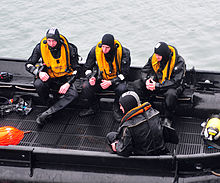Naval Service Diving Section
| Naval Service Diving Section | |
|---|---|
| Template:Lang-ga | |
| Active | 1964–present |
| Country | Ireland |
| Branch | |
| Type | Military diving |
| Role | Underwater search and recovery Maritime EOD Underwater engineering |
| Part of | |
| Garrison/HQ | Haulbowline Naval Base, County Cork, Ireland |
| Insignia | |
| Abbreviation | NSDS |


The Naval Service Diving Section (NSDS) (Template:Lang-ga) is a specialist unit of the Irish Naval Service, a branch of the Defence Forces, the military of Ireland. The Naval Service Diving Section specialises in underwater diving tasks for the Naval Service, and since its formation in the early 1960s has become Ireland's most advanced diving team, aiding other state agencies in various specialist roles.[1]
Roles
The main roles of the NSDS are:-
- Search and recovery
- Underwater survey
- Explosive ordnance disposal (EOD)
- Underwater engineering
- Military diving training[2]
The NSDS will reportedly be developing a Mine Counter Measures capability to protect sea lanes.[3]
Organisation
The Diving Section was officially established in 1964 when Commodore Joe Deasy (then a lieutenant) brought back skills he learned from the British Royal Navy to the Irish Naval Service. During the mid-1980s, the diver training course was set up at Haulbowline Naval Base, Cork Harbour, and since then over 1,400 Naval Service men and women have applied to join the elite unit, with just 150 succeeding (a pass rate of just 9.3%), all men.[4] Each year around 50 Naval Service personnel apply to join the unit, roughly 15 of these are selected for the 11-week Naval Diving Course and on average just 5 complete it.[4] The course is conducted during the winter months to prepare divers for the harshest conditions. Each diver needs to undertake 17 separate training courses to stay current on the section's equipment.[3]
The NSDS operates a 24-hour on-call capability, ready to respond rapidly to any tasking around the state.[3]
The NSDS is the only International Diving Schools Association (IDSA) accredited diving school in Ireland.[3]
The Naval Service Diving Section provides specialised training and certification for the special operations unit of the Irish Defence Forces, responsible for the provision of air and combat diving technique training for the Army Ranger Wing (ARW) Combat Diving Section.[5]
The NSDS conducts EOD and explosive ordnance reconnaissance (EOR) training alongside diving units of the Royal Navy and Royal Canadian Navy.[3]
Domestic operations
In 1973, the NSDS was involved in its first high-profile operation during the interception of the Claudia, a vessel importing arms for the Provisional IRA.[6]
In 1979, the section was tasked to assist during the Whiddy Island disaster, in which the oil tanker Betelgeuse exploded in Bantry Bay claiming the lives of 50 people.[6]
In 1985, they were was tasked with the search and recovery operation of Air India Flight 182, which came down off the south-west Irish coast in the deadliest terrorist bombing in aviation history, resulting in the deaths of 329 people.[7] Two of the divers involved in that operation were awarded Distinguished Service Medals (DSM).[6]
Overseas operations
NSDS teams have been involved in "Operation PONTUS" from 2015 onward, aboard Irish Naval Service vessels in the Mediterranean Sea as part of the European Union's humanitarian response to the European migrant crisis.[3]
Known members
Vice admiral Mark Mellett, current chief of staff of the Irish Defence Forces, is a former member of the NSDS.[8]
See also
References
- ^ "Naval Service Specialist Units: Naval Service Diving Section". Irish Naval Service. Retrieved 27 June 2015.
- ^ "Naval Service Diving Section (NSDS)". Irish Defence Forces 2013. Retrieved 27 June 2015.
- ^ a b c d e f O'Regan, Lt. Com. Tony (Winter 2016). "The Elite : Naval Service Diving Section". SIGNAL – the official magazine of RACO – Representative Association of Commissioned Officers. Vol. 14, no. 1. pp. 19–22. ISSN 1649-7635. Retrieved 6 January 2017.
- ^ a b "Elite seamen bid to pass gruelling Navy test". Irish Mirror. 17 January 2015. Retrieved 27 June 2015.
- ^ "Specialist Dive Team Operations". Defence Forces Ireland. 29 December 2014. Retrieved 27 June 2015.
- ^ a b c O'Riordan, Sean (19 October 2015). "Diving unit's story revealed". Irish Examiner. Retrieved 16 December 2016.
- ^ "Special Report: Air India Flight 182". AirDisaster.Com. Archived from the original on 7 October 2009. Retrieved 27 June 2015.
- ^ "Appointment of New Chief of Staff". Irish Defence Forces Press Office. 30 June 2015. Retrieved 9 July 2015.
Further reading
- Buckley, Martin J (2015). The ninth ship : the Irish Naval Service Diving Section : an account of operations, training & the recompression chamber, 1964–2014. Ireland: Eva Books. ISBN 9780993411007.

